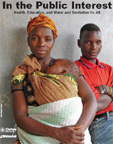
Le portail rinoceros d’informations sur les initiatives citoyennes pour la construction d’un autre monde a été intégré au nouveau site Ritimo pour une recherche simplifiée et élargie.
Ce site (http://www.rinoceros.org/) constitue une archive des articles publiés avant 2008 qui n'ont pas été transférés.
Le projet rinoceros n’a pas disparu, il continue de vivre pour valoriser les points de vue des acteurs associatifs dans le monde dans le site Ritimo.
In the public interest : health, education, water and sanitation for all
> 2006, 142 p. (pdf)
 Vital public services (health, education, water and sanitation) are the key to transforming
the lives of people living in poverty.
Building strong public services for all is hardly a new idea: it is the foundation upon which
today’s rich country societies are built. More recently, developing countries have followed suit,
with impressive results. Sri Lanka, Malaysia, and Kerala state in India, for example, have within
a generation made advances in health and education that took industrialised countries 200 years
to achieve. Building strong public services is not a new idea, but it has been proven to work.
It should be at the very heart of making poverty history.
Vital public services (health, education, water and sanitation) are the key to transforming
the lives of people living in poverty.
Building strong public services for all is hardly a new idea: it is the foundation upon which
today’s rich country societies are built. More recently, developing countries have followed suit,
with impressive results. Sri Lanka, Malaysia, and Kerala state in India, for example, have within
a generation made advances in health and education that took industrialised countries 200 years
to achieve. Building strong public services is not a new idea, but it has been proven to work.
It should be at the very heart of making poverty history.
In the twenty-first century it is a scandal that anyone lives without these most basic of human rights, yet millions of families still do. Today:
- 4,000 children will be killed by diarrhoea, a disease of dirty water
- 1,400 women will die needlessly in pregnancy or childbirth
- 100 million school-age children, most of them girls, will not go to school.
This report shows that developing countries will only achieve healthy and educated populations if their governments take responsibility for providing essential services. Civil society organisations and private companies can make important contributions, but they must be properly regulated and integrated into strong public systems, and not seen as substitutes for them. Only governments can reach the scale necessary to provide universal access to services
- Read the whole Oxfam International Report In the public interest : health, education, water and sanitation for all
document de référence rédigé le : 2006
date of on-line publication : 12 March 2007
© rinoceros - Ritimo in partnership with the Fph via the project dph and the Ile de France region via the project Picri. Site developed using SPIP, hosted by Globenet. Legal mentions - Contact









